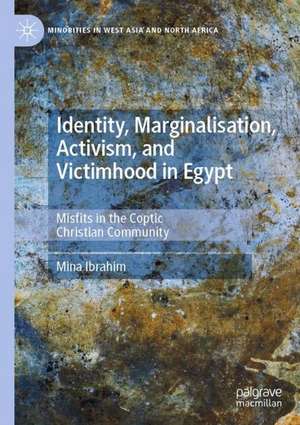Identity, Marginalisation, Activism, and Victimhood in Egypt: Misfits in the Coptic Christian Community: Minorities in West Asia and North Africa
Autor Mina Ibrahimen Limba Engleză Hardback – dec 2022
Drawing on many years of fieldwork accompanied and preceded by periods the author spent as a student and a lay servant in different forms of services in the Coptic Orthodox Church, the book acknowledges the recent anthropological work that is critical of how the secular West and its academia misrepresent God and His believers in the Middle East. However, the fact that this book extends its arguments from “ethnographic confessions” collected from who deal with God on a daily basis since their childhood, it investigates the implications and consequences of inviting God to be part of an anthropological study that complicates aspects of repentance and salvation among the largest Christian minority in the Middle East.
| Toate formatele și edițiile | Preț | Express |
|---|---|---|
| Paperback (1) | 781.15 lei 6-8 săpt. | |
| Springer International Publishing – dec 2023 | 781.15 lei 6-8 săpt. | |
| Hardback (1) | 786.36 lei 6-8 săpt. | |
| Springer International Publishing – dec 2022 | 786.36 lei 6-8 săpt. |
Preț: 786.36 lei
Preț vechi: 958.98 lei
-18% Nou
Puncte Express: 1180
Preț estimativ în valută:
150.48€ • 156.22$ • 125.48£
150.48€ • 156.22$ • 125.48£
Carte tipărită la comandă
Livrare economică 25 martie-08 aprilie
Preluare comenzi: 021 569.72.76
Specificații
ISBN-13: 9783031101786
ISBN-10: 3031101782
Pagini: 326
Ilustrații: XXI, 326 p. 11 illus., 8 illus. in color.
Dimensiuni: 148 x 210 x 29 mm
Greutate: 0.57 kg
Ediția:1st ed. 2022
Editura: Springer International Publishing
Colecția Palgrave Macmillan
Seria Minorities in West Asia and North Africa
Locul publicării:Cham, Switzerland
ISBN-10: 3031101782
Pagini: 326
Ilustrații: XXI, 326 p. 11 illus., 8 illus. in color.
Dimensiuni: 148 x 210 x 29 mm
Greutate: 0.57 kg
Ediția:1st ed. 2022
Editura: Springer International Publishing
Colecția Palgrave Macmillan
Seria Minorities in West Asia and North Africa
Locul publicării:Cham, Switzerland
Cuprins
Chapter 1: Introduction.- Chapter 2: Collecting Shubra.- Chapter 3: “The Word Became Flesh”.- Chapter 4: Living (and Writing) in Times of Hegemony.- Chapter 5: Tricks that Matter.- Chapter 6: Martyrologies of Rubble.- Chapter 7: Jails with(-out) Miracles.- Chapter 8: Conclusion.
Notă biografică
Mina Ibrahim is a postdoctoral fellow at the University of Marburg and an affiliate researcher at the Leibniz-Zentrum Moderner Orient (ZMO). He is also the project coordinator of the MENA Prison Forum (MPF) and the founder of SARD for History and Social Research (Shubra’s Archive).
Textul de pe ultima copertă
This book, first ethnographic attempt, examines negated spaces, practices, and relationships that have been intentionally or unintentionally dismissed from academic and non-academic studies, articles, reports, and policy papers that investigate and debate the experiences of Coptic Orthodox Christians in Egypt. By taking the Coptic identity and faith to bars, liquor stores, coffeehouses, weed gatherings, prisons, casinos, night clubs, brothels, dating applications, and porn sites, this book argues that airing out this “dirty laundry” points to the limits of victimhood and activist narratives that shape the representation of Coptic grievances and interests on both national and international levels. By introducing misfits who exist in the shadows of the well-studied Coptic rituals, traditions, miracles, saints’ apparitions, and street protests, the book highlights the contradiction between the centrality of sin to the (Coptic) Christian tradition and theology, on one hand, and on the other hand the dismissal of lives that are dominantly labelled as sinful while simultaneously studying Copts as agents or victims of history and in today’s Egyptian society.
Drawing on many years of fieldwork accompanied and preceded by periods the author spent as a student and a lay servant in different forms of services in the Coptic Orthodox Church, the book acknowledges the recent anthropological work that is critical of how the secular West and its academia misrepresent God and His believers in the Middle East. However, the fact that this book extends its arguments from “ethnographic confessions” collected from who deal with God on a daily basis since their childhood, it investigates the implications and consequences of inviting God to be part of an anthropological study that complicates aspects of repentance and salvation among the largest Christian minority in the Middle East.
Mina Ibrahim is a postdoctoral fellow at the University of Marburg and an affiliate researcher at the Leibniz-Zentrum Moderner Orient (ZMO). He is also the project coordinator of the MENA Prison Forum (MPF) and the founder of SARD for History and Social Research (Shubra’s Archive).
Drawing on many years of fieldwork accompanied and preceded by periods the author spent as a student and a lay servant in different forms of services in the Coptic Orthodox Church, the book acknowledges the recent anthropological work that is critical of how the secular West and its academia misrepresent God and His believers in the Middle East. However, the fact that this book extends its arguments from “ethnographic confessions” collected from who deal with God on a daily basis since their childhood, it investigates the implications and consequences of inviting God to be part of an anthropological study that complicates aspects of repentance and salvation among the largest Christian minority in the Middle East.
Mina Ibrahim is a postdoctoral fellow at the University of Marburg and an affiliate researcher at the Leibniz-Zentrum Moderner Orient (ZMO). He is also the project coordinator of the MENA Prison Forum (MPF) and the founder of SARD for History and Social Research (Shubra’s Archive).
Caracteristici
Examines negated spaces, practices, and relationships Highlights the contradiction between the centrality of sin to the (Coptic) Christian tradition and theology Acknowledges the recent anthropological work







